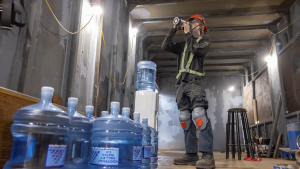WorkSafeBC (WSBC), which is a partner in the Partners in Injury and Disability Prevention Program, otherwise known as the Certificate of Recognition (COR), has been undertaking consultations for new policy and practice directives for the program.
Despite rumours of possible changes, the construction industry should not expect any adjustments to it during this calendar year.
“To allow time for these consultations, the current interim policies will remain in place until Dec. 31, 2018,” said Chris Back, WSBC’s director of industry and labour services.
This recent news will no doubt come as a relief to members of the B.C. construction industry who have benefited from the COR program.
“The COR program is of critical interest to the British Columbia construction industry,” said Dave Baspaly, president of the Council of Construction Associations (COCA). “As such, COCA is committed to ensuring it continues to work for our members. Construction has spent over 10 years building agreements with other provinces, sectors and industries.”
Baspaly said COCA knows “categorically” that the COR program is working for both employers and employees.
“Today COR directly impacts construction’s ability to conduct business through tendering, procurement and reciprocity agreements with other jurisdictions,” Baspaly said. “It is critical that this program does not change significantly, for fear of destabilizing these agreements, the economics of our industry, and perhaps most importantly, the safety of our workers.”
The COR program, which is trademarked through the Canadian Federation of Construction Safety Associations, is a voluntary program that recognizes and rewards employers who exceed legislative and regulatory requirements in implementing occupational health and safety (OH&S) and return-to-work programs.
The program was piloted in 2002 in the construction industry, in collaboration with WSBC.
It was expanded to oil and gas in 2004 and then to all industries in 2006.
Employers who pass an audit of their OH&S practices receive a COR which makes them eligible for a rebate of 10 per cent of their WSBC premium.
The BC Construction Safety Alliance (BCCSA) is WSBC’s COR-certifying partner for the construction industry.
The alliance is responsible for offering and monitoring COR in construction and for ensuring the integrity of the audit process, including making sure the performance of each of the auditors is up to snuff.
Mike McKenna, BCCSA executive director, said COR has become a recognized standard for workplace safety in the province.
“Every year, since 2010, there has been an increase in the number of BCCSA COR-certified companies,” said McKenna. “As of the end of 2016, a total of 1,004 companies had achieved COR certification, up from 606 in 2010.”
He said both small and large construction companies have been getting COR certification.
In 2010, there were 161 small COR companies. In 2016, there were 267, an increase of 60 per cent over six years.
“Criticisms of COR frequently include that it is primarily for larger employers who have more resources to complete the requirements,” said McKenna. “Most construction companies are small- or medium-sized. Although obtaining COR certification is more challenging for them, they continue to sign on.”
McKenna said the number of COR certifications is also increasing because some organizations have made the safety seal of approval mandatory.
For example, BC Hydro and the City of Kamloops require subcontractors to be COR-certified and the Roofing Contractors Association of BC requires COR certification for its members.
“The expansion of COR as a requirement speaks volumes to the credibility, reputation and effectiveness of this program,” said McKenna. “We have entered a new era in which the reasons for obtaining COR have moved well beyond the availability of rebates.”
McKenna said COR contractors have told the BCCSA that certification “makes a positive difference,” because it emphasizes improved hazard awareness and formalized safety practices and procedures for preventing incidents and injuries.
There is also empirical data showing a strong connection between COR certification and improved safety outcomes, McKenna said.
A recent study by researchers at the University of British Columbia looked at 1,135 COR-certified construction companies and compared their injury rates to those of their non-COR-certified counterparts.
It found that, between 2005 and 2012, COR-certified companies averaged a 12 per cent lower short-term disability, long-term disability and fatality injury rate, and a 17 per cent lower serious injury rate.
Between 2009 and 2014, the serious injury rate fell by 22 per cent, while the rates for short-term disability, long-term disability and fatality rates remained the same.











Recent Comments